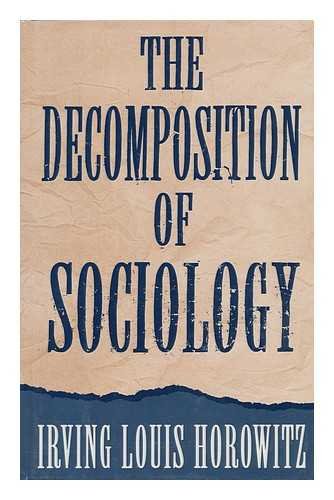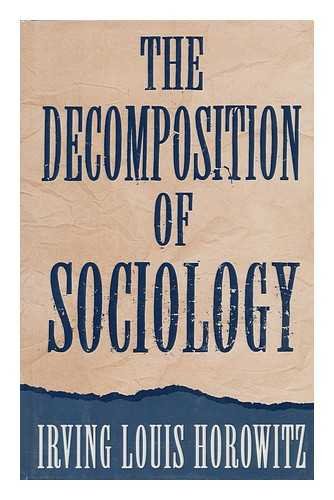Oxford University Press
Decomposition of Sociology
Regular price
$7.95 USD
Regular price
Sale price
$7.95 USD
Unit price
per
Shipping calculated at checkout.
Couldn't load pickup availability
Title: Decomposition of Sociology
Author: Horowitz, Irving Louis
ISBN: 9780195073164
Publisher: Oxford University Press
Published: 1993
Binding: Regular Hardback
Language: English
Condition: Used: Very Good
Clean, unmarked copy with some edge wear. Good binding. Dust jacket included if issued with one. We ship in recyclable American-made mailers. 100% money-back guarantee on all orders.
Sociology 1563274
Publisher Description:
Sociology, writes Irving Louis Horowitz, has changed from a central discipline of the social sciences to an ideological outpost of political extremism. As a result, the field is in crisis. Some departments have been shut down, others cut back, research programs have dried up, and the growth of
professional organizations and student enrollments have been either curbed or atrophied. In The Decomposition of Sociology, Professor Horowitz, for four decades a leading social scientist, offers a frank and full account of the maelstrom engulfing this field.
Horowitz pulls no punches in this provocative volume. He charges that much contemporary sociological theory has degenerated into pure critique, strongly influenced by Marxist dogmatism. Such thinking has a strong element of anti-American and anti-Western bias, in which all questions have one
answer--the evil of capitalism--and all problems one solution--the good of socialism. In criminology, for instance, he shows that high crime rates are seen as an expression of capitalist disintegration, and criminal behavior a covert expression of radical action. Indeed, in one area after another,
Horowitz shows how this same formulaic thinking dominates the field, resulting in a crude reductionist view of contemporary social life. At a time when the world is moving closer to the free market and democratic norms, he concludes, such reductionist tendencies and ideological posturings are
outmoded.
Horowitz offers an alternative. He urges a larger vision of the social sciences, one in which universities, granting agencies and research institutes provide an environment in which research may be untainted by partisan agencies--where policy choices will not be hindered by the prevailing cultural
climate. He counsels sociologists to move away from blind advocacy, to meet the challenges of the twenty-first century by incorporating the knowledge of other times and places, and to take into account the shrinking
Author: Horowitz, Irving Louis
ISBN: 9780195073164
Publisher: Oxford University Press
Published: 1993
Binding: Regular Hardback
Language: English
Condition: Used: Very Good
Clean, unmarked copy with some edge wear. Good binding. Dust jacket included if issued with one. We ship in recyclable American-made mailers. 100% money-back guarantee on all orders.
Sociology 1563274
Publisher Description:
Sociology, writes Irving Louis Horowitz, has changed from a central discipline of the social sciences to an ideological outpost of political extremism. As a result, the field is in crisis. Some departments have been shut down, others cut back, research programs have dried up, and the growth of
professional organizations and student enrollments have been either curbed or atrophied. In The Decomposition of Sociology, Professor Horowitz, for four decades a leading social scientist, offers a frank and full account of the maelstrom engulfing this field.
Horowitz pulls no punches in this provocative volume. He charges that much contemporary sociological theory has degenerated into pure critique, strongly influenced by Marxist dogmatism. Such thinking has a strong element of anti-American and anti-Western bias, in which all questions have one
answer--the evil of capitalism--and all problems one solution--the good of socialism. In criminology, for instance, he shows that high crime rates are seen as an expression of capitalist disintegration, and criminal behavior a covert expression of radical action. Indeed, in one area after another,
Horowitz shows how this same formulaic thinking dominates the field, resulting in a crude reductionist view of contemporary social life. At a time when the world is moving closer to the free market and democratic norms, he concludes, such reductionist tendencies and ideological posturings are
outmoded.
Horowitz offers an alternative. He urges a larger vision of the social sciences, one in which universities, granting agencies and research institutes provide an environment in which research may be untainted by partisan agencies--where policy choices will not be hindered by the prevailing cultural
climate. He counsels sociologists to move away from blind advocacy, to meet the challenges of the twenty-first century by incorporating the knowledge of other times and places, and to take into account the shrinking

